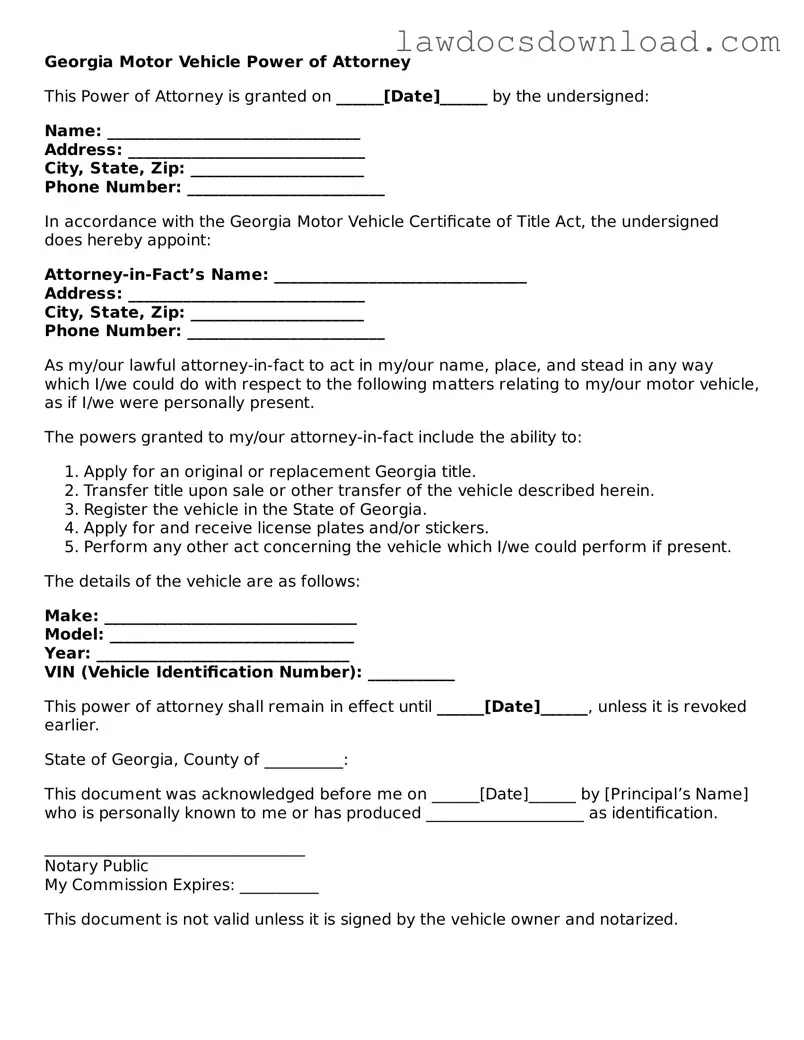The General Power of Attorney is similar to the Georgia Motor Vehicle Power of Attorney form in that it grants broad authority to an agent to act on someone's behalf. However, unlike the specific focus on motor vehicle transactions, a General Power of Attorney covers a wide range of actions, including financial and legal decisions. This flexibility allows the agent to manage almost all of the principal's affairs, not just those related to a vehicle.
A Durable Power of Attorney shares similarities with the Georgia Motor Vehicle Power of Attorney in allowing someone else to make decisions on a person's behalf. The main difference lies in its endurance; the durable version remains in effect even if the principal becomes incapacitated. This distinction ensures decisions about the principal’s motor vehicle, among other matters, can still be made if they're unable to do so themselves due to health issues.
The Medical Power of Attorney, while also a document granting decision-making power to an agent, differs from the Georgia Motor Vehicle Power of Attorney by focusing solely on healthcare decisions. It comes into play when the principal cannot make their own healthcare decisions. Both documents operate under the principle of representation, but they apply to distinct areas of a person's life: one to health, and the other to motor vehicle matters.
The Limited Power of Attorney is closely related to the Georgia Motor Vehicle Power of Attorney because it grants an agent authority to act in specific scenarios. The similarity lies in the narrow scope of authority granted. However, while the Motor Vehicle Power of Attorney is limited to vehicle-related transactions, a Limited Power of Attorney could apply to any number of situations, such as selling property or handling certain financial affairs, as specified by the principal.
The Real Estate Power of Attorney and the Georgia Motor Vehicle Power of Attorney both allow an agent to handle transactions on behalf of the principal. The Real Estate Power of Attorney, specifically, empowers an agent to manage the buying, selling, or managing of property. The similarity is in the representation for transactions, but the difference is in the type of property involved—real estate as opposed to vehicles.
The Financial Power of Attorney resembles the Georgia Motor Vehicle Power of Attorney in its function of authorizing someone else to handle your affairs. However, it focuses on a broader range of financial matters, such as managing bank accounts, paying bills, and investing. While both documents allow for financial transactions, the Motor Vehicle Power of Attorney is specifically limited to those involving vehicles.
A Child Care Power of Attorney provides temporary authority for someone to make decisions about a child's welfare, similar to how the Georgia Motor Vehicle Power of Attorney allows for vehicle transactions. This similarity is in the delegation of decision-making authority. However, the focus of the Child Care Power of Attorney is on the care and custody of a child, contrasted with the specific administrative and legal actions related to a vehicle.
The Springing Power of Attorney is akin to the Georgia Motor Vehicle Power of Attorney in that it designates someone to act on the principal’s behalf. Its unique feature is that it only becomes effective under certain conditions, such as the principal's incapacitation. This conditional activation contrasts with the more immediate effect of the Motor Vehicle Power of Attorney upon approval.
The Business Power of Attorney grants someone the authority to manage a wide array of business-related decisions and transactions, echoing the delegation of decision-making found in the Georgia Motor Vehicle Power of Attorney. While the Business Power of Attorney encompasses decisions from operational to financial for a business, the Motor Vehicle Power of Attorney remains focused on tasks related to vehicles.
Lastly, the Tax Power of Attorney, similar to the Georgia Motor Vehicle Power of Attorney, allows an individual to appoint someone to handle specific matters on their behalf, in this case, tax-related issues. Both forms ensure that an expert or trusted individual can take care of specialized tasks, ensuring compliance and efficiency. However, the distinct difference is in the realm of what is being managed: one is for vehicle matters, and the other for taxes.

